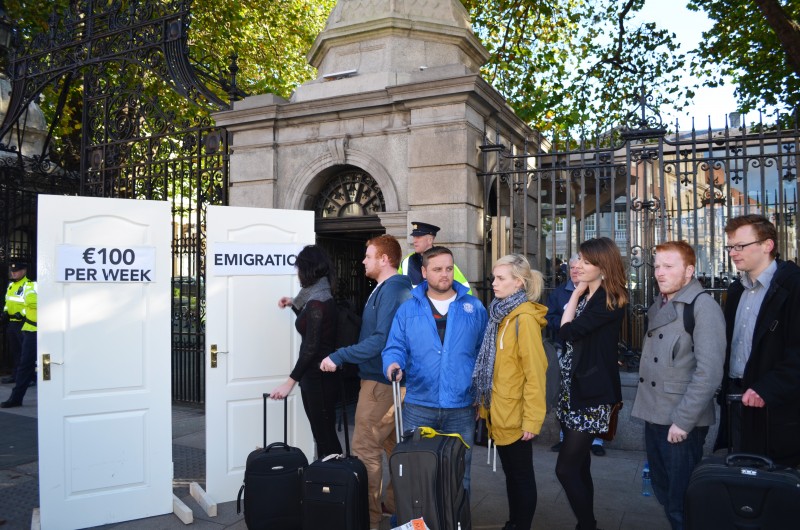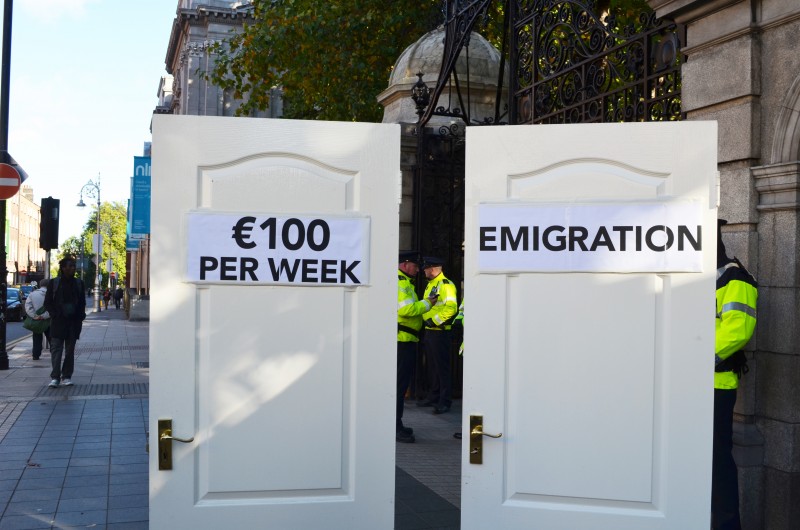Laura Harmon | Contributing Writer
Unpaid internships are on the increase in Ireland. As of September there were 86,000 people in publicly-funded ‘labour activation schemes’. This number has nearly doubled in four years – up from 45,000 in 2009.
Internships have always played a role in the economy where there is a skills mismatch. However, that role has transformed and internships are beginning to replace work that should be paid. There is still a skills mismatch in some areas. For example, we know that 64% of all job losses in Ireland since 2007 have been in the construction sector.
While there is a skills mismatch, this cannot account for the 200,000 additional people unemployed this year from six years ago. As the OECD told us in September “higher aggregate demand and job creation” are the primary factors of concern in reducing unemployment. There are simply not enough jobs to go around. In fact, there are 26 job applications for every job advertised.
Internship culture is massively expanding in the U.S., where we should be looking for trends. In 1992, 17% of graduates took on an internship and by 2008, that number was 50%. In Ireland, it is becoming more and more expected that young people ‘need’ to earn their place in the workforce by completing some unpaid work first.
Provided you are doing work of value to the employer, have a similar level of supervision and responsibility as the rest of the workforce – then you are likely to be entitled to be paid at least the national minimum wage
What constitutes an internship and what constitutes paid work? The Irish Congress of Trade Unions have produced an information factsheet on intern rights (http://www.ictu.ie/internrights/) which says that provided you are doing work of value to the employer, have a similar level of supervision and responsibility as the rest of the workforce – then you are likely to be entitled to be paid at least the national minimum wage regardless of what title your employer has put on you .But it is important to note that if a person is on a Government intern or work experience scheme – that scheme may be exempt from minimum wage laws and then different rights to payment apply.
Job Bridge is just one of many Government schemes and it does not work effectively. I would argue that it has lost most, if not all credibility. The reality is that one in five interns leave dissatisfied. 3% of employers admitted to using the scheme to displace existing paid employment (Indecon report). This amounts to around 300 employers yet to date, yet only 23 companies have been banned from using JobBridge.

Members of “We’re Not Leaving” on the ‘Dáil Queue’. Photo by Leanna Byrne.
In fact, 28.6% of interns eventually progressed to employment with their host organisation which tallies with the 29% of employers who said that they would have been highly/fairly likely to have offered paid employment in the absence of the JobBridge scheme (Indecon report). Why are the Government paying for companies to replace what would have been paying jobs with unpaid internships? Would this money not be better spent on targeting specific skills instead or increasing the student maintenance grant to encourage people to enter education?
Schemes like JobBridge put downward pressure on wages and there are already problems in relation to this. Half of the workplaces inspected by the National Employment Rights Agency (NERA), between January and October 2012, for compliance with the National Minimum Wage were found to be paying under the €8.65 hourly rate. A JobBridge intern working an average working week of 40 hours (and we can see from the Indecon Report that many work longer hours) makes €3.75 per hour.
The economic crisis in Ireland has also left us with a youth crisis. 41.8% of those aged 18-24 are at risk of poverty or social exclusion. Employment is up for over 35s in latest Quarterly National Household Survey, but it is actually down 6,000 jobs in the under 35 category.
Budget 2014 introduced significant cuts to Jobseeker’s Allowance for young people. The payment to new entrants aged 22-24 is reduced from €144 to €100 per week, and for those aged 25 the payment is reduced from €188 to €144 per week.
According to Moira Murphy, Organiser with We’re Not Leaving: “The proposed cuts to social welfare will drive young people into poverty. While welfare payments have been consistently reduced for people under the age of 25 since 2009, this cut will have a more severe impact than any of the previous ones. With the rising cost of living, especially the lack of access to rent allowance and increasingly unaffordable transport fares, with 100 euro to live on a week the Government is sending out a clear message – emigrate or live in poverty.”
If a young worker moves to Dublin City Centre, and then becomes unemployed, €100 per week is not sufficient to live off without some other assistance.
Most jobs adverstised are in urban areas. These welfare cuts do not take into account the geographical location in which people live or the costs associated with travelling to seek work or undertake an internship. According to the Daft (2013) rental report, renting a single room costs €433 in Dublin City Centre, and €286 in Cork City Centre per month. If a young worker moves to Dublin City Centre, and then becomes unemployed, €100 per week is not sufficient to live off without some other assistance. Unemployed young workers may need to move back to their native region, and search for work there. This can affect inter-regional mobility and contribute to social exclusion of young people. Furthermore, not all young people have families to move home to or additional supports available and emigration itself is expensive. It is not a viable option for everyone.
The Government also announced in Budget 2014 that they would be introducing fees for all apprentices for the time they spend in Institutes of Technology. These will start at approximately €540 and will increase, depending on the Apprenticeship and the time spent attending at the Institutes during their off the job training on Phases 4 and 6. This will prohibit the participation of many on these courses.
While there was a 14 million euro investment in the Youth Guarantee in Budget 2014, it falls far short of the estimated 273 million euro required to implement it properly. But even with the Youth Guarantee, we need to ensure that any internship schemes are closely monitored so that it doesn’t turn into another JobBridge. Some necessary steps to prevent this include creating an oversight body including representatives from unions employers and Government and ensuring that the practice of replacing paid employment with internships is against the law, and subject to appeal to an Ombudsman. Clear criteria needs to be set out as to what skills can be exchanged to constitute an internship. Internships could be formalized with certificates and limits should be imposed as to how long an internship can last for and how many places a company can advertise.
Lastly, the Government needs follow the example of countries like Scotland by committing to introducing equality budgeting in Ireland. This will help Ireland move to a more conscientious approach to budgetary decisions and ensure that impact assessments are conducted to prevent cuts disproportionately affecting certain sections of society over others.







